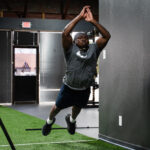Sports Training Tips for Beginners
Starting a new training routine can be exciting—and a little overwhelming. Whether you’re getting ready for your first season or just want to get fit, sports training offers the structure and support you need to succeed.
This guide covers beginner-friendly sports training tips that build a strong foundation and help prevent injuries.
Set Clear Goals Before You Start
The first step in effective sports training is knowing what you want to achieve. Do you want to run faster? Build strength? Improve endurance?
By setting clear and realistic goals, you can measure progress and stay motivated. Write them down and revisit them often.
When your training has purpose, you’ll train smarter and stay more focused.
Start With a Balanced Training Plan
A good sports training plan covers all areas of fitness—strength, endurance, flexibility, and mobility. Avoid focusing on just one element.
As a beginner, include:
-
Strength training twice a week
-
Cardio sessions 3–4 times weekly
-
Flexibility work like stretching or yoga
This variety not only builds total fitness but also reduces the risk of overuse injuries. Always include rest days in your routine to recover.
Learn Proper Form From the Start
Bad form leads to poor performance and injuries. Early in your sports training journey, focus on technique.
Take time to learn correct posture, breathing, and movement patterns. If possible, work with a coach or personal trainer who can give feedback.
Resources like Next Level Athletics USA provide expert guidance for athletes of all levels.
Good form ensures you get the most out of every workout and stay injury-free.
Don’t Skip Warm-Ups and Cool-Downs
Warming up prepares your body for exercise. Cooling down helps prevent soreness and promotes recovery.
A proper warm-up raises your heart rate and gets your muscles ready. Spend 5–10 minutes doing light cardio and dynamic stretches.
After training, cool down with slow movements and gentle stretches. This supports blood flow and helps muscles repair.
These simple steps make a huge difference in the effectiveness of your sports training.
Focus on Nutrition and Hydration
Fueling your body right is part of training smart. Eat balanced meals with protein, carbs, and healthy fats.
Hydration is equally important. Drink water before, during, and after workouts. Dehydration reduces performance and increases injury risk.
According to Healthline, proper nutrition supports energy levels, recovery, and overall fitness.
Stay Consistent and Be Patient
Progress takes time. One of the biggest challenges in sports training is sticking with it. Some days will feel tough. Others will feel easy.
Consistency is key. Create a weekly routine and do your best to follow it. Track your progress and celebrate small wins.
If you miss a workout, don’t get discouraged. Just pick up where you left off and keep going.
Listen to Your Body
As you train, your body will give you feedback. Pay attention. If something feels painful or wrong, stop and rest.
Overtraining is common in new athletes. Signs include fatigue, irritability, soreness, or trouble sleeping. If you notice these symptoms, take a break.
Always remember: rest is part of training. It helps you get stronger and avoid injury.
Conclusion: Start Smart, Train Strong
Beginning a sports training routine is a smart move for anyone looking to improve athletic performance. With the right plan, mindset, and support, you’ll build strength, gain confidence, and enjoy the process.
Stay focused, train consistently, and don’t be afraid to ask for help. Visit Next Level Athletics USA to get personalized coaching and expert support as you start your training journey.
Your best athletic self is waiting—start training today!


Recent Comments